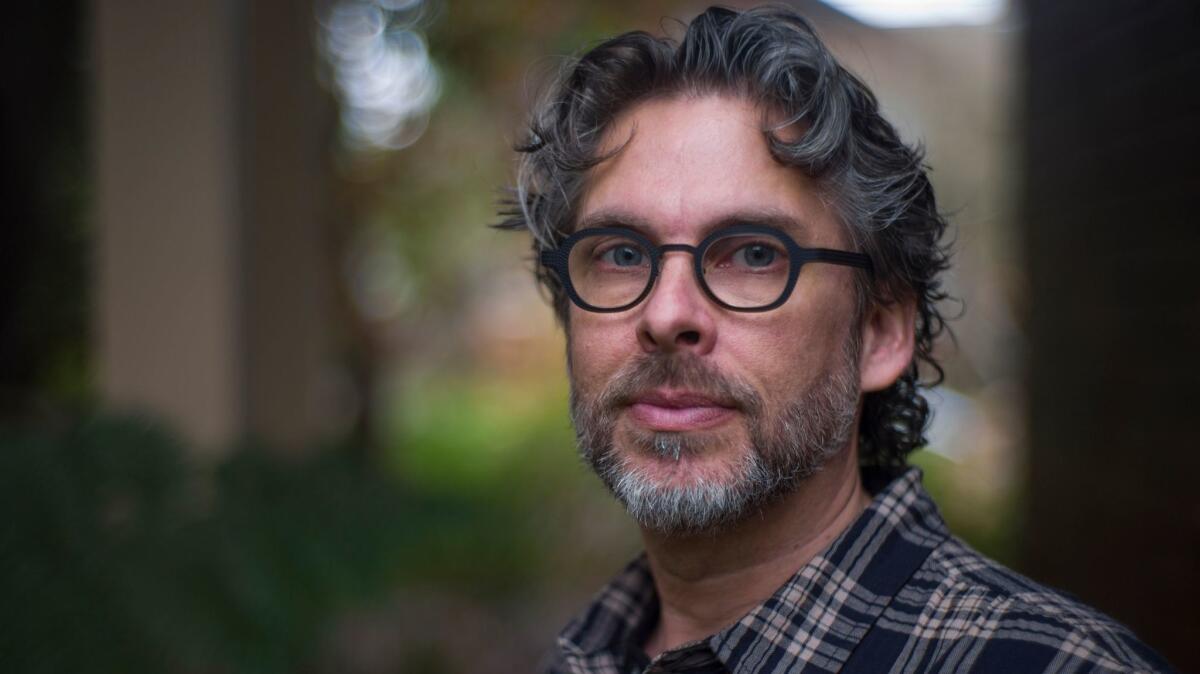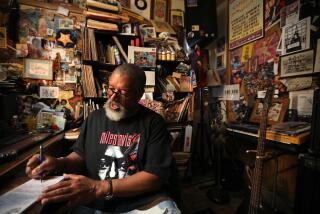Michael Chabon and his new novel, ‘Moonglow’

- Share via
Fatherhood has long fascinated Michael Chabon. In one of the essays included in the 2009 collection “Manhood for Amateurs,” the writer traced his own longing to be a father to his childhood affection for the “Free to Be … You and Me” animated television special, which included a cartoon segment of the song “William Wants A Doll.” “It meant so much to me,” Chabon said in a phone interview from his home in Berkeley. “And it wasn’t because I wanted a doll. I didn’t want a doll. What I think what I wanted was to have a dad who wanted to be a dad, in a way that William in that story wanted to be a father. And I didn’t.”
Chabon is a father now himself; he and his wife, writer Ayelet Waldman, have four children. His newest novel, “Moonglow,” is a sweeping family history couched in the conceit of a literary memoir, a multi-generational saga in which children and grandchildren seek to make sense of their fathers’ secrets, lies and loves.
“This is how I heard the story” is how the narrator begins — after an author’s note stating, in part, “I have stuck to facts except when facts refused to conform with memory, narrative purpose, or the truth as I prefer to understand it.”
What follows are stories of war, invention, violence and romance; at the book’s center is the vexed love story between the narrator’s grandparents. When the couple meet, he’s just back from war, but she, the narrator’s future grandmother, is even more scarred: “From the first that was a part of his attraction to her: not her brokenness but her potential for being mended and, even more, the challenge that mending her would pose. He thought that if he took on the job of loving this broken woman, some measure of sense or purpose might be returned to his life.”
To be clear, although “Moonglow” pretends to be a memoir — its narrator is named Michael Chabon, for instance — it’s a novel. “It’s a commonplace thing for novelists to do,” Chabon said, “and we’ve been doing it for centuries now, to create a fake nonfictional document. It’s a convention.”
In “Moonglow,” the fictional Michael Chabon tells the story of his grandfather; the author Chabon thought it would be “a fun thing to try.” It was also “a fruitful way to get at something that I wanted to try to get at — about truth and the way that it’s manufactured within families, and the way that family stories come into being: the things that get included, the things that get censored out, the way that a consensus can be arrived at, or the way that some stories just never get resolved, and people will go to their graves giving two totally different accounts of exactly the same thing that they were both present for.”
Initially, Chabon thought he was going to write a sequel to 2012’s “Telegraph Avenue” set in more or less contemporary Oakland. But when he sat down to write, what came to mind instead was one of his own family stories — the one about the time his great-uncle was fired from his job as a traveling salesman at a paper form company because the owner needed to give a job to a family friend, the accused spy Alger Hiss.
It’s the kind of story Chabon loves — “a moment where this enormous arc of pop cultural history intersects with this tiny arc of anonymous personal history”— and after turning his great-uncle into his fictional grandfather, the incident became the book’s first scene.
“In hindsight,” Chabon added, “one of the nonfictional bases for this book is that when my actual grandfather was dying, he was on heavy-duty painkillers. He did talk a lot, and his memory was activated in an interesting way, maybe by some combination of proximity to death and these painkillers. I’d heard a lot of his stories, but these things that he was remembering during this period when I was sitting with him right before he died were new, like new boxes had been brought down from the attic and opened up.”
Chabon heard his dying grandfather’s stories when he was 25, “right around that age where you finally first become capable of realizing that your grandparents are people, not just stock characters out of the story of your childhood.” With that revelation came its immediate, terrifying aftershock: “To feel that and know that and then to think: All this stuff, the real stuff, the stuff that he might not even necessarily remember — I’m never going to hear that stuff. I never did get to know him on some level, because by the time that even became thinkable for me it was too late, which is kind of the tragedy of grandparents for a lot of us.”
“To try to see the whole of a person can be such a difficult thing to do,” Chabon said, “and to see the whole of a time is even harder, but those are the things that were unconsciously driving me as the scope of the book increased.” Like the fictional grandparents in “Moonglow,” whose love story plays out against and in spite of the trauma of the Holocaust, the devastation of Europe and the mad race to weaponize science, Chabon’s real grandparents were among the generation that came of age during World War II. Born in 1963, Chabon came of age in a cultural landscape still dominated by the war and its aftermath.
“I grew up during the space race, during the height of tensions between Russia and the United States, and the Vietnam War, which was itself part of the cold war, which in turn was a sequel to WWII.” Everywhere — in television programs “Hogan’s Heroes” and “F Troop,” in James Bond movies and Marvel comics — pop culture was still framing its battles in terms of Nazis and GIs. “I don’t think you can underestimate the total saturation of American culture and society in the 1960s and 1970s with World War II and its echoes,” Chabon said. “It’s inherently fascinating to me.”
Growing up in a politically engaged family, Chabon gravitated toward history from an early age. “I liked to read nonfiction as a kid, and a lot of the fiction I read was historical fiction,” he said. “History continues to be one of my greatest pleasures to read and study.” But he rejects the idea that he could have become a history professor instead of a novelist. “You have to stick to the facts. It’s so boring — when you’re writing, I mean,” he said.
And it was clear early on that writing was his thing. “I really just loved to read. Falling in love with a particular book, or particular authors, or in some cases a particular illustrator,” he said. “And eventually, fairly young, getting to a place where I wanted to try it myself. I think it’s very much the fan-fiction impulse, that feeling of like, ‘I love this so much, there’s not enough of it, I need to make more.’ ”
In a recent essay in GQ Magazine, Chabon wrote about accompanying his youngest child to men’s fashion week in Paris; at the end, he realized that his son had found his thing, his people. It’s a beautiful moment in a sweet and moving essay, and although Chabon found his thing — writing — early on, he didn’t find his people until he married Waldman and became a father. “That experience became my first real, solid, enduring feeling of finding my people,” he said. “In a way, I kind of had to make them. I didn’t have a club. I never had a club to belong to. And now these guys are my club.”
Tuttle is a board member of the National Book Critics Circle and a regular contributor to the Boston Globe; she is founding director of the Decatur Writers Studio.
Michael Chabon with David L. Ulin
Where: ALOUD at the L.A. Central Library, 630 W. 5th St., Los Angeles
When: 7:15 p.m. Nov. 30
Info: lfla.org/event/moonglow/
More to Read
Sign up for our Book Club newsletter
Get the latest news, events and more from the Los Angeles Times Book Club, and help us get L.A. reading and talking.
You may occasionally receive promotional content from the Los Angeles Times.










